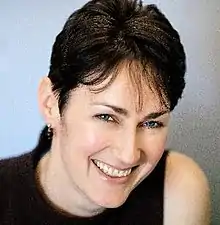Maria Bitner-Glindzicz
Maria Bitner-Glindzicz (26 June 1963 – 20 September 2018) was a British medical doctor, honorary consultant in clinical genetics at Great Ormond Street Hospital, and a professor of human and molecular genetics at the UCL Institute of Child Health.[1] The hospital described her work as relating to the "genetic causes of deafness in children and therapies that she hoped would one day restore vision." She researched Norrie disease and Usher syndrome, working with charities including Sparks and the Norrie Disease Foundation, and was one of the first colleagues involved in the 100,000 Genomes Project at Genomics England.
Professor Maria Bitner-Glindzicz | |
|---|---|
 | |
| Born | 26 June 1963 Fleetwood, England |
| Died | 20 September 2018 (aged 55) St John Street, London, England |
| Nationality | British |
| Alma mater | |
| Known for | Clinical Genetics |
| Spouse(s) | David Miles |
| Scientific career | |
| Fields | |
| Institutions | |
She died after her bicycle was involved in a collision with a taxi in London.[2][3][4][5]
Education
Bitner-Glindzicz attended Rendcomb College, a boarding school in Gloucestershire, while her parents lived in Hong Kong. She received her medical (MBBS) degree from University College London in 1987, also achieving a first-class intercalated degree. She began to consider a career in clinical genetics upon qualifying, later going on to complete a PhD funded through an MRC Clinical Research Fellowship.[6] Her research interests were the genetic causes of deafness in children and adults, such as Norrie disease and Usher syndrome.
Career
Her research group at the UCL Institute of Child Health, in collaboration with others in Europe, identified a number of genes responsible for syndromic and non-syndromic forms of deafness, including X-linked deafness, the cardio-auditory syndrome,[7] and Usher syndrome.[8] Their research explored the expression and functional effects of mutations identified in these genes in patients in order to understand how they give rise to disease. Bitner-Glindzicz's work on Usher syndrome initiated the National Collaborative Usher Study,[9] a large clinical and molecular study of people with Usher syndrome in the UK, in collaboration with Karen Steel at the Wellcome Trust Sanger Institute.
In addition, she was interested in ototoxicity and the mechanisms and genetic basis of this, exploring whether near-bedside genetic testing for mutations predisposing to ototoxicity was feasible. Her work led to improvements in clinical services for patients, including more comprehensive molecular diagnosis for deafness, and specialist clinics in and around London.[8] These included genetic deafness clinics at Great Ormond Street Hospital and the Royal National Throat Nose and Ear Hospital, as well as a joint sensory clinic for patients with dual sensory impairment at the National Hospital for Neurology and Neurosurgery with Linda Luxon, Andrew Webster, and representatives from Sense.
Bitner-Glindzicz was one of the earliest colleagues to be involved with the 100,000 Genomes Project at Genomics England. She published over 175 articles on her research.[10] Alongside her clinical and research work, she supported charities including Sparks and was the driving force behind the setting up of the Norrie Disease Foundation.[1] She was described by Great Ormond Street Hospital as a genuine advocate for her patients and an articulate voice who tirelessly pushed for greater support for children affected by sight and hearing impairments.[11]
Personal life
Maria Bitner-Glindzicz lived in London. She was married, with one daughter and one son.
References
- "GOSH News Article".
- Burgess, Kaya (22 September 2018). "Top geneticist Maria Bitner-Glindzicz dies after cycling crash with cab". The Times.
- "Pioneering geneticist killed in crash while cycling in London". London Evening Standard. 21 September 2018.
- UCL (June 2018). "Maria Bitner-Glindzicz". UCL Great Ormond Street Institute of Child Health.
- "Hospital professor killed in bike crash". BBC News. 21 September 2018.
- UCL (June 2018). "Maria Bitner-Glindzicz". UCL Great Ormond Street Institute of Child Health. Retrieved 2018-09-25.
- Sánchez Cascos, A; Sánchez-Harguindey, L; De Rábago, P (1 January 1969). "Cardio-auditory syndromes. Cardiac and genetic study of 511 deaf-mute children". British Heart Journal. 31 (1): 26–33. doi:10.1136/hrt.31.1.26. PMC 487439. PMID 5006822.
- "UCL Profile".
- "Natural History and Genetic Studies of Usher Syndrome - Full Text View - ClinicalTrials.gov". clinicaltrials.gov. Retrieved 25 September 2018.
- "UCL Profile Publications".
- "GOSH Tribute".